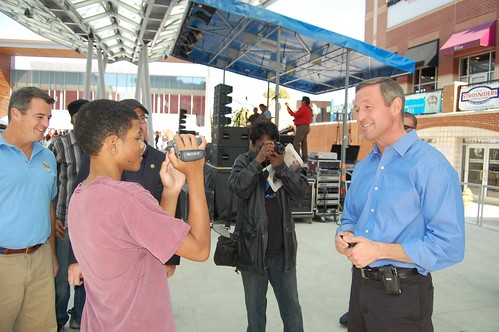Many years ago there was a television series in Britain called “The Cres”. Short for “The Crescent”, the series followed the day-to-day lives of the fictional residents of a street somewhere in England. Most episodes were engaging and humorous, and made compelling viewing. An article I read this morning reminded me of this, and made me think that a “hyperlocal” blog could work really well for a school.
By “hyperlocal” I mean, incredibly local. Not merely the same town, but the local neighbourhood, even the same street. If I had the time, I’d start one up myself. You might think there wouldn’t be enough material to sustain a blog of that nature, but there definitely would. For example, one of our neighbours is a cab driver, and what cab driver does not have many (tall) stories to tell? Another bakes cakes for weddings. Baking a cake to be shared by 200 people is completely different from baking a cake to be consumed by a family of four. Yet another neighbour is the representative of the local Neighbourhood Watch, in which role she liaises with local police and other residents.
 Student reporters. Photo by Edward Kimmel http://www.flickr.com/photos/mdfriendofhillary/
Student reporters. Photo by Edward Kimmel http://www.flickr.com/photos/mdfriendofhillary/
What would be the benefits of a hyperlocal blog for a school? For me, as well as the journalistic and ICT skills it would help to develop, there would also be the possibilities of rich connections, both with other subjects and with people and organisations outside the school. For example:
- What does baking a cake for 200 people involve? Can you use some sort of cake template, or mechanise at least part of the process? That sort of questioning could provide links with Design & Technology. Do you charge for the ingredients up front, or invoice the clients afterwards? How does your decision affect your cash flow? How do you advertise your services, and what do you offer that is better than an off-the-shelf wedding cake? You can see the possible links with Business Studies.
- What is the most prevalent crime in the area, and how can people protect themselves? (Citizenship/PHSE)
- What is the best sort of journey, from an earnings point of view, as far as a cab driver is concerned? For example, is it one that involves a long journey in terms of miles, but a short one in a traffic jam? (Maths/ numeracy, Business Studies)
- Writing would have to be planned, and then written up in the most appropriate style for the readership (which will have to be defined in advance), and proofread. (English/literacy)
- You could link up with the local newspaper. Local newspapers are always looking for fillers – interesting news items that will fill a space. Unlike the national newspapers, they’re interested in local issues. That much is obvious, but what counts as an “issue” for a local newspaper can be very different from a national one.
For example, a cab driver yesterday was telling me that the road we were driving along would be closed on Friday morning, because the Olympic Torch is travelling down it. That will cause rush hour mayhem, but that’s a local issue, not a national one, except in very general terms.
But local issues don’t have to be about crises. If the florists down the road from decides to spend a week specialising in only red, white and blue flowers, to celebrate the Queen’s Jubilee, that is of local interest. If one of the local takeaways decides to use only recycled packaging, that is of interest. If a local shop owner has decided to retire and hand over the reins to his daughter, that is of local interest.
Why shouldn’t the school’s citizen journalists contribute to issues of local interest? (English/literacy).
In practical terms, if you were going to start a hyperlocal blog in a school, you would need to amend “the rules” slightly. After all, you couldn’t have a lesson in which all of your class were knocking on strangers’ doors to ask about their private lives! The blog would have to have two aspects I think: a local (to the school itself) aspect that involved dealing with organisations, so guest visits, Skype interviews and class trips could be arranged on an official basis. For example, within a mile radius of the school down the road there are two other primary (elementary) schools, two secondary (high) schools, a local newspaper and a library, and a short stretch of road full of shops. That means there is plenty of “material” for the school to be getting on with if it started a hyperlocal blog.
The more personal aspect would have to be redefined to be local to the students rather than the school. It wouldn’t be exactly the same, but you’d derive similar benefit to those suggested above. If each student interviewed one neighbour per term, then a class of 30 students would, at least in theory, provide enough material for 30 blog posts. Assuming one published each day, that’s around half a term’s blog posts sorted out.
A project like this could also be extended in other ways:
- Art students could design the graphic elements of the blog
- Students will need to provide photos, and possibly videos…
- Why not extend the idea of reporting into video reporting, for a weekly school news bulletin or a national project such as the BBC’s School Report?
- It could be linked to local fund-raising issues.
- You could invite guest posts by local councillors.
- You could record and then write up interviews with local residents (Local History?).
I think I’ve only scratched the surface here. I’m sure you can think of even more benefits of a hyperlocal blog.
The article I read which inspired this article was: Five things The New York Times learned from its three-year hyperlocal experiment

